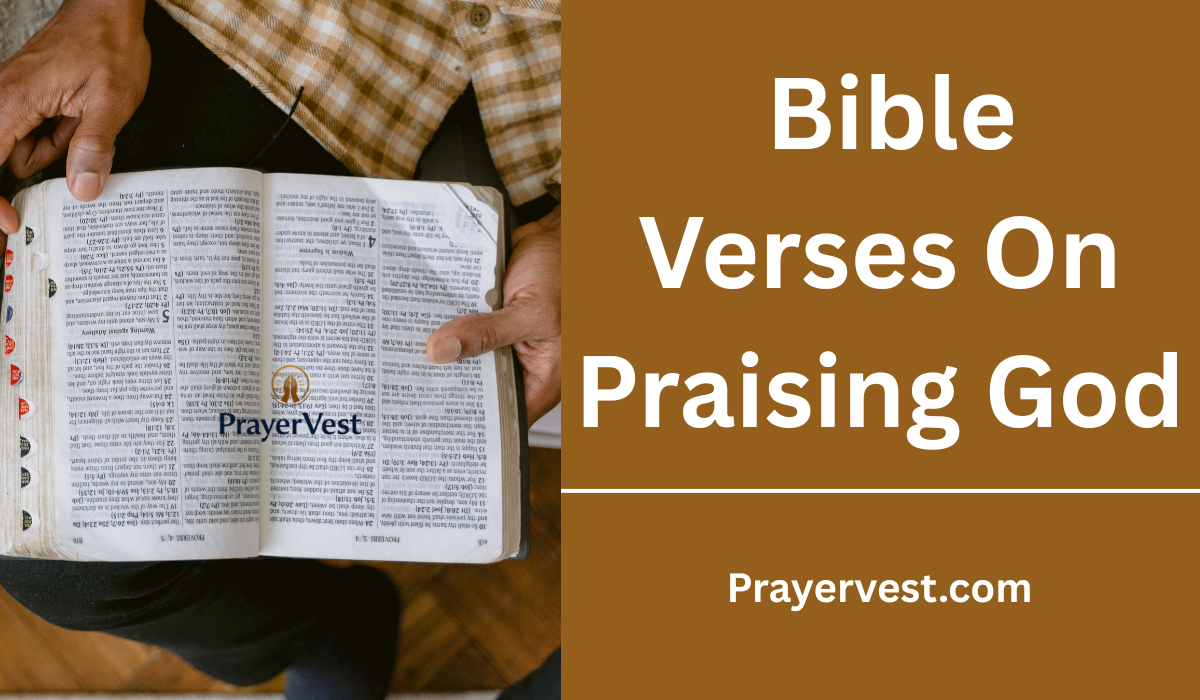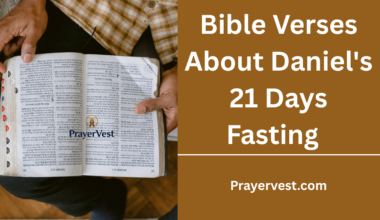A major topic in the Bible is praise, which expresses the heart of a believer who acknowledges God’s majesty, goodness, and faithfulness. Scripture exhorts us to give thanks for God’s unwavering character, His benevolence, and His creation in addition to His bounties.
Praising God is presented as both a spiritual discipline and a natural reaction to experiencing His presence in everything from David’s psalms to the writings of prophets. It is a show of appreciation, respect, and recognition that He alone is the source of all goodness and life.
Giving thanks to God is more than just saying it aloud; it involves our entire being, including our feelings, ideas, and deeds. Worship, singing, gratitude, and obedience are ways that believers honor and show their devotion to God. According to the Bible, praise has the capacity to uplift the soul, calm the mind, and even bring about divine favor.
Additionally, it facilitates spiritual connection by bringing the believer into line with God’s desire and paving the way for the manifestation of His blessings and direction.


Examining Bible passages about giving thanks to God offers guidance and motivation for leading an ongoing life of worship. These verses show us how to enjoy God’s sovereignty at all stages of life, develop an attitude of thankfulness, and hold fast to our faith during difficult circumstances. By reflecting on these verses, believers are reminded that praise is a way of life that praises God, fortifies faith, and brings one closer to His presence rather than merely a reaction to events.
40 Uplifting Bible Verses On Praising God (2026)
1. Psalm 100:4
“Enter his gates with thanksgiving and his courts with praise; give thanks to him and praise his name.”
This verse encourages believers to approach God with hearts full of gratitude and worship. It reminds us that praise is not just a song or ritual, but an intentional act of entering God’s presence with joy and acknowledgment of His goodness. By combining thanksgiving with praise, we recognize both God’s deeds and His character. This passage teaches that genuine worship begins with a thankful heart, setting the tone for spiritual intimacy and celebration of God’s faithfulness.
2. Psalm 150:6
“Let everything that has breath praise the Lord. Praise the Lord.”
This verse is a universal call to worship, extending beyond humans to all creation. It emphasizes that praise is a natural response to life itself, acknowledging the Creator for His sustaining power. The repetition of “Praise the Lord” reinforces the centrality of worship in the life of every believer. By embracing this call, we recognize that praising God is both a privilege and a responsibility, reminding us that every breath we take is an opportunity to honor Him.
3. Psalm 34:1
“I will bless the Lord at all times; his praise shall continually be in my mouth.”
Here, the psalmist commits to constant praise, highlighting the importance of maintaining a spirit of worship regardless of circumstances. It teaches that praise is not limited to moments of joy or victory but should be a continual posture of the heart. This verse encourages believers to make praise habitual, allowing it to shape our outlook, sustain our faith, and declare God’s goodness in every season of life.
4. Hebrews 13:15
“Through Jesus, therefore, let us continually offer to God a sacrifice of praise—the fruit of lips that openly profess his name.”
This passage links praise to a spiritual offering, emphasizing that our words can serve as acts of worship. By openly professing God’s name, we align our hearts with His glory, turning speech into a sacred act. The verse teaches that praise is both intentional and relational, connecting our hearts to God through Christ. Continuous praise becomes a spiritual discipline that strengthens our faith and demonstrates devotion beyond mere ritual.
5. Psalm 145:3
“Great is the Lord and most worthy of praise; his greatness no one can fathom.”
This verse declares the boundless greatness of God, inspiring awe and reverence. It reminds believers that praise is a response to His infinite attributes—His wisdom, power, and love. Since God’s greatness cannot be fully comprehended, our praise becomes an expression of humility and recognition of His supremacy. This passage encourages us to celebrate the majesty of God continually, deepening our worship and understanding of His eternal nature.
6. Psalm 103:1-2
“Praise the Lord, my soul; all my inmost being, praise his holy name. Praise the Lord, my soul, and forget not all his benefits.”
This passage emphasizes the holistic nature of praise, calling both the soul and the inner being to worship God. It reminds believers to reflect on God’s blessings, mercy, and faithfulness as motivation for heartfelt praise. By not forgetting His benefits, praise becomes a conscious acknowledgment of God’s ongoing provision and care. This verse teaches that true worship involves remembering God’s goodness and letting gratitude shape our spiritual expression.
7. Psalm 95:1-2
“Come, let us sing for joy to the Lord; let us shout aloud to the Rock of our salvation. Let us come before him with thanksgiving and extol him with music and song.”
The psalmist invites believers into communal worship, combining joy, music, and thanksgiving. Praise here is portrayed as both celebratory and deliberate, uniting hearts in acknowledgment of God as our “Rock”—a symbol of strength and refuge. This verse highlights that worship is not passive; it is an active, joyous expression of love and reverence, encouraging believers to approach God together with exuberant hearts.
8. Psalm 148:1-2
“Praise the Lord. Praise the Lord from the heavens; praise him in the heights above. Praise him, all his angels; praise him, all his heavenly hosts.”
This verse expands praise beyond humanity to include all creation, emphasizing the universality of worship. By calling on angels and heavenly hosts, it illustrates that praise is cosmic, acknowledging God’s sovereignty over all realms. Believers are reminded that worship aligns us with the eternal chorus of creation, situating our earthly praise within a broader, divine context.
9. Psalm 96:1-2
“Sing to the Lord a new song; sing to the Lord, all the earth. Sing to the Lord, praise his name; proclaim his salvation day after day.”
Here, praise is presented as a dynamic and ongoing activity, encouraging creativity (“a new song”) and consistency in declaring God’s salvation. This verse teaches that worship is both expressive and continuous, inviting believers to celebrate God’s redemptive work daily. It underscores that praising God involves active engagement and a willingness to refresh our worship regularly.
10. Isaiah 25:1
“Lord, you are my God; I will exalt you and praise your name, for in perfect faithfulness you have done wonderful things, things planned long ago.”
This verse emphasizes God’s faithfulness and the importance of remembering His long-term plans and deeds. Praise becomes an acknowledgment of His reliability, wisdom, and mighty acts throughout history. Believers are encouraged to exalt God not only for present blessings but also for His unwavering faithfulness across generations. This teaches that true worship is rooted in both gratitude and trust.
11. Psalm 71:8
“My mouth is filled with your praise, declaring your splendor all day long.”
The psalmist emphasizes the continual nature of praise, portraying it as an ever-present response to God’s splendor. This verse teaches that praise should permeate daily life, influencing our speech, thoughts, and actions. By declaring God’s glory throughout the day, believers cultivate a lifestyle of worship that shapes their character and strengthens their relationship with Him.
12. Psalm 66:1-2
“Shout for joy to God, all the earth! Sing the glory of his name; make his praise glorious.”
This verse encourages exuberant and public expressions of praise, emphasizing both communal worship and personal engagement. By calling us to “make his praise glorious,” it reminds believers that worship should be vibrant, heartfelt, and worthy of God’s majesty. This passage highlights that praise is both an offering and a celebration, reflecting the joy of recognizing God’s greatness.
13. Psalm 149:1
“Praise the Lord. Sing to the Lord a new song, his praise in the assembly of his faithful people.”
The psalmist underscores the importance of community in worship, where new songs and expressions of praise strengthen collective faith. Worship becomes a unifying act, connecting believers as they honor God together. This verse teaches that praise is both personal and corporate, enriching the spiritual life of the community while deepening individual devotion.
14. 1 Chronicles 16:34
“Give thanks to the Lord, for he is good; his love endures forever.”
This declaration links praise with thanksgiving, emphasizing God’s enduring love as the foundation of worship. It reminds believers to celebrate God’s goodness consistently, fostering gratitude and trust. The verse teaches that praising God is an acknowledgment of His constant care, inviting believers to rejoice in His faithfulness and mercy continually.
15. Psalm 147:1
“Praise the Lord. How good it is to sing praises to our God, how pleasant and fitting to praise him!”
This verse highlights the joy and appropriateness of praising God, portraying worship as both delightful and natural. It encourages believers to recognize the pleasure that comes from expressing adoration and gratitude. By affirming the goodness of praise, the psalmist teaches that worship is not only a duty but also a source of spiritual joy and renewal.
16. Psalm 63:3-4
“Because your love is better than life, my lips will glorify you. I will praise you as long as I live, and in your name I will lift up my hands.”
The psalmist expresses deep devotion, linking praise to God’s surpassing love. Praise is portrayed as a natural response to experiencing God’s care, shaping both speech and action. By lifting hands in worship, believers physically and spiritually acknowledge His presence. This verse teaches that genuine praise flows from recognizing the immeasurable value of God’s love and should continue throughout our lives.
17. Psalm 89:1
“I will sing of the Lord’s great love forever; with my mouth I will make your faithfulness known through all generations.”
Here, praise is both a declaration of God’s love and a testimony to His faithfulness. The psalmist emphasizes continuity, linking worship with generational remembrance. This teaches that praise is not only a personal act but also a legacy, passing down acknowledgment of God’s steadfast love and faithfulness to future generations.
18. Psalm 111:1
“Praise the Lord. I will extol the Lord with all my heart in the council of the upright and in the assembly.”
The psalmist highlights wholehearted praise, emphasizing sincerity and integrity. Worship is not merely public performance but an authentic outpouring of devotion shared with the faithful. This verse teaches that praising God with our entire heart deepens both personal faith and communal unity, reflecting genuine reverence.
19. Psalm 112:1
“Praise the Lord. Blessed are those who fear the Lord, who find great delight in his commands.”
This verse connects praise with reverence and obedience. Blessing and delight arise when believers honor God’s instructions, demonstrating that worship extends beyond words to lifestyle. Praise here is intertwined with living a God-centered life, reminding us that true worship encompasses both devotion and action.
20. Psalm 118:28-29
“You are my God, and I will praise you; you are my God, and I will exalt you. Give thanks to the Lord, for he is good; his love endures forever.”
The psalmist combines personal declaration and communal gratitude, emphasizing God’s eternal goodness. Praise is presented as both affirmation and celebration, rooted in recognition of His steadfast love. This verse teaches that worship should be heartfelt, expressive, and continuously directed toward God’s enduring faithfulness.
21. Psalm 146:1-2
“Praise the Lord. Praise the Lord, my soul. I will praise the Lord all my life; I will sing praise to my God as long as I live.”
The psalmist commits to lifelong praise, reinforcing that worship is not seasonal but a constant, enduring practice. This verse teaches that praise should permeate every stage of life, making devotion and adoration a perpetual part of our spiritual journey.
22. Psalm 147:7
“Sing to the Lord with grateful praise; make music to our God on the harp.”
This passage emphasizes musical praise as an expression of gratitude. Worship becomes an artful response to God’s goodness, combining creativity with heartfelt devotion. The verse teaches that music and artistry can amplify our praise, helping believers engage fully in glorifying God.
23. Psalm 149:6
“May the praise of God be in their mouths and a double-edged sword in their hands.”
Here, praise is linked to spiritual authority and power. The psalmist portrays worship as not only celebratory but also transformative, equipping believers to confront challenges. This verse teaches that praise carries strength and purpose, impacting both the worshiper and the spiritual environment around them.
24. Psalm 22:3
“But you are holy, enthroned on the praises of Israel.”
This verse reveals a profound truth: God inhabits the praises of His people. Worship creates a sacred space where His presence dwells. It teaches that praise is more than words—it is a spiritual atmosphere that invites God’s presence and power into our lives and communities.
25. Psalm 40:3
“He put a new song in my mouth, a hymn of praise to our God. Many will see and fear the Lord and put their trust in him.”
The psalmist links personal praise with influence over others, showing how worship can inspire faith in those around us. Praise becomes a testimony, reflecting God’s deliverance and prompting reverence in others. This verse teaches that worship has both personal and communal impact, drawing others closer to God.
26. Psalm 71:23
“My lips will shout for joy when I sing praise to you—my soul also, which you have redeemed.”
This verse highlights the emotional and spiritual dimension of praise. Worship is a joyful response to God’s redemptive work, engaging both the heart and the soul. The psalmist teaches that praising God connects gratitude with inner renewal, celebrating His saving power with heartfelt expression.
27. Psalm 92:1-2
“It is good to praise the Lord and make music to your name, O Most High, proclaiming your love in the morning and your faithfulness at night.”
The psalmist emphasizes the consistency of praise, suggesting daily acknowledgment of God’s love and faithfulness. Worship becomes a rhythm of life, marking both beginnings and endings. This verse teaches that integrating praise into our daily routine nurtures continual awareness of God’s presence and provision.
28. Psalm 96:9
“Worship the Lord in the splendor of his holiness; tremble before him, all the earth.”
This passage calls for reverent and awe-filled praise, acknowledging God’s holiness and majesty. Worship is presented as both joyful and respectful, combining celebration with humility. The verse teaches that praising God requires recognition of His transcendent greatness and our need for reverence.
29. Psalm 135:3
“Praise the Lord, for the Lord is good; sing praise to his name, for that is pleasant.”
The psalmist links praise with pleasure, showing that worship is fulfilling and uplifting. Recognizing God’s goodness naturally inspires joy and gratitude. This verse teaches that praise is both an obligation and a delight, making worship a source of spiritual joy and renewal.
30. Psalm 71:8
“My mouth is filled with your praise, declaring your splendor all day long.”
This verse emphasizes continuous praise, portraying worship as a lifelong dedication. The psalmist encourages believers to keep God’s glory at the forefront of speech and thought. It teaches that praise is a daily discipline, shaping character and drawing our hearts closer to God consistently.
31. Psalm 33:1-3
“Sing joyfully to the Lord, you righteous; it is fitting for the upright to praise him. Praise the Lord with the harp; make music to him on the ten-stringed lyre. Sing to him a new song; play skillfully, and shout for joy.”
This passage emphasizes joyful, skillful, and creative praise. The psalmist encourages believers to use their talents and abilities to honor God. It teaches that praise should be expressive, heartfelt, and accompanied by skillful artistry, reflecting the joy and devotion of the worshiper.
32. Psalm 145:1-2
“I will exalt you, my God the King; I will praise your name for ever and ever. Every day I will praise you and extol your name for ever and ever.”
The psalmist declares a commitment to continual praise, emphasizing consistency and devotion. Worship is presented as an eternal practice that spans time and circumstance. This verse teaches that praising God daily reinforces our relationship with Him and cultivates an enduring attitude of reverence and gratitude.
33. Psalm 136:1
“Give thanks to the Lord, for he is good. His love endures forever.”
This verse links praise with thanksgiving, focusing on God’s everlasting love. The psalmist reminds believers that gratitude and praise are inseparable, forming a foundation for worship. It teaches that recognizing God’s enduring goodness is central to authentic praise and strengthens trust in His faithfulness.
34. Psalm 148:13
“Let them praise the name of the Lord, for his name alone is exalted; his splendor is above the earth and the heavens.”
This passage emphasizes God’s supremacy and the universal call to worship. Praise is a response to His exalted position and unmatched glory. The verse teaches that true worship acknowledges God’s authority over all creation, inspiring awe and humility in the worshiper.
35. Psalm 30:4
“Sing the praises of the Lord, you his faithful people; praise his holy name.”
The psalmist calls believers to faithfulness and joyful expression in praise. Worship is portrayed as both communal and heartfelt, rooted in reverence for God’s holiness. This verse teaches that praise strengthens the bonds of the faithful and fosters a deeper sense of devotion and trust in God.
36. Psalm 148:5
“Let them praise the name of the Lord, for at his command they were created.”
This verse links praise with God’s creative power. All creation is called to worship because life itself originates from His command. The passage teaches that acknowledging God as Creator deepens the significance of praise, reminding believers that worship is a response to His magnificent handiwork.
37. Psalm 113:3
“From the rising of the sun to the place where it sets, the name of the Lord is to be praised.”
The psalmist emphasizes the constancy of praise, urging believers to worship God at all times and in all places. This verse teaches that praising God should be a continual lifestyle, transcending circumstances and marking every moment with gratitude and reverence.
38. Psalm 149:5
“Let his faithful people rejoice in this honor and sing for joy on their beds.”
This verse highlights personal and private praise, showing that worship is not limited to public or communal settings. Even in solitude, believers are called to rejoice and honor God. It teaches that praise is a deeply personal act that nurtures spiritual joy and intimacy with the Lord.
39. Revelation 4:11
“You are worthy, our Lord and God, to receive glory and honor and power, for you created all things, and by your will they were created and have their being.”
This passage reminds believers that all praise and worship are due to God because of His creative authority. The verse emphasizes God’s worthiness and the reason for continual adoration. It teaches that true praise recognizes His power, sovereignty, and sustaining hand in all of creation.
40. Revelation 5:13
“Then I heard every creature in heaven and on earth and under the earth and on the sea, and all that is in them, saying: ‘To him who sits on the throne and to the Lamb be praise and honor and glory and power, for ever and ever!’”
This verse culminates the theme of universal praise, uniting all creation in worship before God and the Lamb. It teaches that worship is eternal, cosmic, and inclusive, reminding believers that praise transcends time and space. Every act of worship aligns us with the eternal chorus of heaven, magnifying God’s glory and supremacy.
Conclusion
To sum up, Bible passages on giving thanks to God serve as a reminder that worship is an authentic way to show our appreciation, respect, and love for the Creator. Praise boosts a believer’s faith, praises God’s goodness, and acknowledges His sovereignty. These verses inspire us to sing loudly, give thanks in prayer, and lead lives that demonstrate unwavering dedication. Praising God is still a potent approach to align our hearts with His plan and have a real, life-changing experience of His presence, whether we are going through a happy or difficult moment.
In the end, giving thanks to God fosters our emotional and spiritual health. It draws His benefits into our life, strengthens our relationship with Him, and cultivates humility. In addition to honoring God, we can develop resilience, joy, and serenity by reflecting on these verses and implementing praise into our daily lives. According to scripture, a life rooted in faith, hope, and steadfast trust in God’s unending goodness and love is full of praise.






